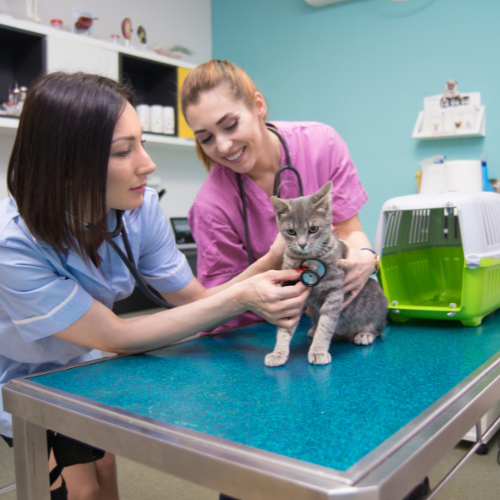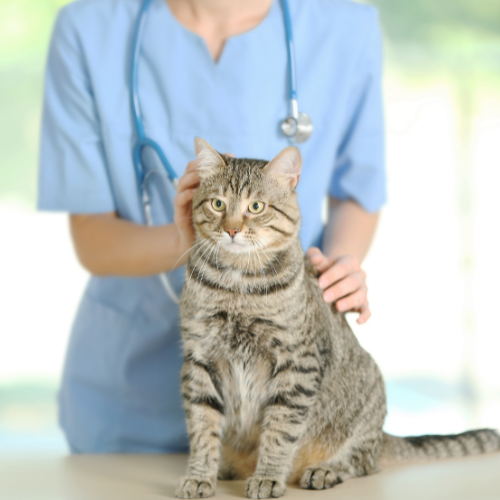Cats frequently get worm infections due to their susceptibility to internal parasites. If your cat is infested with worms, you need to get yours dewormed in order to get rid of these life-threatening creatures. Additionally, it’s crucial to isolate your diseased Cat from the rest of your household’s feline and human inhabitants while the kitty deworming medication takes place since worms are also contagious and zoonotic. But what about the time in which deworming medication works? Or, in other words, how long after deworming a cat are the worms gone?
After deworming, worms in cats can usually go away in two to three weeks; however, certain medications will also require a booster dosage to clear the remaining parasites.

Things to Consider Before Deworming Your Cat
Deworming your Cat at least once every two weeks up until they reach the age of three months is highly advised. Most newborn kittens still have parasites even if their mothers have been dewormed. So, deworming them after two weeks is a good option. Furthermore, deworming kitties are also determined by the level of exposure risk in your area.
- Figuring the worm types
Identifying the worm type that affects your kitty is also a crucial and significant factor in treating it (according to its type). There are mainly four types of intestinal worms in cats, hookworms, whipworms, roundworms, and tapeworms.
- Empty Stomach
Food in your kitty’s stomach may make it harder to absorb antiparasitic medications efficiently.
- Separate from others
Children, the elderly, women who are pregnant, people who are battling cancer, people with diabetes, and anyone with an impaired immune system are at a greater risk. Many of the parasites that may be found in cats are zoonotic, which means that they can be passed from animals to people and cause illness. If anyone in your home could be at a larger risk for exposure, you should exercise extreme caution, separate them from affected kitties and take additional precautions.
5 Ways to Deworm Your Cat
- Tapeworms
If a cat has tapeworms, the owner or the veterinarian would often identify the condition based on the presence of tapeworm pieces in the Cat’s stool or the area surrounding the Cat’s rear end. On the other hand, Faecal floats are not as reliable as other methods for diagnosing tapeworms.
Tablets or injections are both acceptable methods for administering the anthelmintic drug that is used for deworming. Typically, just a single dosage of an oral dewormer is required. After receiving therapy, the tapeworm will eventually die and will be digested by the body’s intestines; as a result, worm segments will not typically be passed in the stool.
- Roundworms
The fecal float test is commonly used to diagnose roundworms in cats. This test requires a sample of the kitty’s feces to be examined under a microscope in order to search for roundworm eggs. In addition, because cats may not exhibit any symptoms of having roundworms, she suggests conducting a fecal float test on each Cat once a year in order to check for the presence of the parasite.
Deworming medicine is usually administered orally to cats who are infested with roundworms. This medication will instantly begin killing the worms once ingested by the Cat. Numerous treatments may be required for cats that have a significant number of roundworms. Deworming medication is typically administered to kittens as a preventative measure due to the high prevalence of roundworms in this population.
- Whipworm
Infestations of whipworms in cats are typically treated with pyrantel pamoate or fenbendazole. These are some examples of antiparasitic medications that your veterinarian might recommend for your Cat to get rid of the whipworms that it has. Intravenous treatment may also be administered to cats or kittens that are dehydrated or have anemia in order to counteract the consequences of whipworm infection. Anti-inflammatory medications are another type of treatment that doctors frequently recommend for patients with an inflamed large or small intestine interior.
- Hookworm
A fecal float test, which is also used to screen for roundworms, can be used to detect hookworm eggs in the stool of a cat. If your Cat has been diagnosed with anemia or shows signs of hookworm infection, your veterinarian may feel compelled to do the test. Hookworms are known to cause skin sores.
Remember, due to the severity of the issues that hookworms can bring and the frequency of reinfection, it is strongly suggested that patients undergo several treatments or follow up with preventive. It is possible to treat an infection with the same medication that is used to prevent infections caused by intestinal and heartworms.
- Natural methods for deworming a cat
- Pumpkin seeds
The amino acid cucurbitacin in pumpkin seeds makes them a potent deworming agent. This causes the worms to become immobile, which makes it much simpler to expel them from the gut. They may be given to your Cat as a treat in their complete form, or you can ground them up into a powder and mix them in with his regular diet. The recommended dosage is one tablespoon of raw pumpkin seeds per ten pounds of body weight twice daily. This does not include the salted savory snack kind of pumpkin seeds.
The recommended dosage is one tablespoon of raw pumpkin seeds per ten pounds of body weight twice daily. This does not include the salted savory snack kind of pumpkin seeds.
- Fasting
Fasting is something that you can do with your Cat to eliminate internal worms. Before you do anything further, check that your Cat is robust and healthy. It is possible to rid the body of bothersome parasites by abstaining from meals for 24 hours and letting them starve. You need not worry about your Cat’s well-being if you perform this task up to once every week.
- Diatomaceous Earth
When used regularly, Diatomaceous Earth eliminates all types of worms from the kitty’s body within a week. However, because Diatomaceous Earth does not kill the eggs, specially formulated diatomaceous earth must be administered for an extended period for it to succeed. This is because the worms must cycle through the lungs and then return to the stomach before the eggs can be caught.

5 Tips to Prevent Reinfection of Worms in the Cat
- After having your Cat dewormed, exercise extreme caution when cleaning up its excrement since you risk contaminating yourself with worm larvae. In addition to that, make sure you wash your hands thoroughly after playing with him.
- Maintain a rigorous flea prevention routine throughout the year, using a combination of oral medications, flea collars, and topical therapies.
- If you want to prevent your Cat from hunting and eating diseased rodents, you should keep him indoors. If it is feasible, ask the veterinarian to write you a prescription for a prophylactic tablet that will protect him from acquiring worms.
- You should regularly clean your pet’s water and food dishes and the litter box they use.
- It is essential to take preventative measures in order to get rid of fleas. These include washing all of the blankets and pillows that are your Cat’s favorites, frequently cleaning the house and the carpets, and cleaning up organic debris such as offcuts, straw, and leaves that fleas are accustomed to sheltering in. Pay particular attention to dark, damp, and moist regions since these are circumstances ideal for the growth and reproduction of fleas.
- Cat Not Eating After the Vet Visit? [What’s Going On?]
- Why Does My Cat Bite Me in the Morning? [Top 5 Reasons]
- My Cat Is Stressing Me Out [Full Guide]
FAQs
Question: Do Cats Poop Out Worms After Being Dewormed? Or Cat Has Worms After Deworming?
Answer: It is possible, but not sure, that you may find worms in your Cat’s excrement in the period following a deworming treatment. This is because the kind of worms that cats have might vary.
In most cases, the treatment for roundworms, hookworms, and whipworms involves paralyzing and then killing the parasites. Still, tapeworm treatment kills them and then breaks them up into smaller pieces.
There are so few intestinal worms that are so little that you won’t even be able to see them in your Cat’s feces, such as whipworms.
Question: Do Live Worms Come Out After Deworming?
Answer: Don’t be surprised if you find live worms in your Cat’s feces after having them wormed; this is very normal.
Question: What to Expect After Deworming a Cat?
Answer: After deworming your kitty with a good dewormer, you must expect that your kitty is free from any worms.
Question: Can I get worms from my Cat sleeping in my bed?
Answer: If your Cat shares your sleeping area with you, there is a chance that you might contract worms from her. It is not an extremely high danger, but it is something that might happen. Eggs (oocytes) of parasites that will later hatch into worms can be passed from humans to other people. For this to occur, the oocytes have to be consumed by the host, making

Verdict
Your Cat has to be dewormed regularly to ensure that they have a healthy and happy life throughout its whole lifespan.
Because your Cat’s veterinarian is a part of the healthcare team for your Cat, you should start a conversation with him or her as soon as possible to ensure that your little furball stays free of internal parasites.

Veterinarian (DVM, MS) Content Writer, Blogger, and WordPress Developer. Working as a pet/animal/bird/fish/reptile/wildlife writer for the past 7 years on many renowned platforms.




